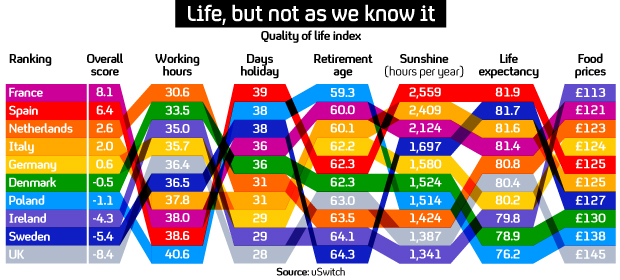UK is the worst place to live in Europe
It’s official. The UK is bottom of the EU pile according to a new survey measuring quality of life in neighbouring countries. But are things really that bad? Channel 4 News investigates.

A survey carried out by consumer comparison website uSwitch found that the UK is the worst place to live when compared with its nine closest EU neighbours.
A combination of a poor work-life balance, expensive food and energy costs, as well as fewer hours of sunshine, is to blame for the UK’s poor performance.
France and Spain topped the league table, which also measured working hours, VAT, holidays, spending on health and education, and government spending on health and education.
The cost of a pack of 20 cigarettes was considered in the survey, and at £6.95, compared with Poland’s £2.84, the UK once again failed consumers.
What mattered most of all to people, was health – their own and their family’s. Paul Allin,ONS
There is no doubt that the cost of living has increased, with the cost of food, fuel and energy on the rise.
However the UK has the fourth highest household income in Europe, and still managed to come bottom. Could it be that money isn’t the key to happiness?
The secret to happiness
Apparently not, according to the Office of National Statistics (ONS), which is developing new ways to understand and measure wellbeing, following the government’s decision that GDP was not an accurate measure of happiness.
An ONS public consultation involving 34,000 people, found that non-monetary factors were more important in their lives.

“What mattered most of all to people, was health – their own and their family’s,” Paul Allin, director of the ONS measuring well-being programme, told Channel 4 News.
“Good relationships and connection with family, friends and partners were also important.”
Job satisfaction was also a factor, along with economic stability and environment – both immediate surroundings, and the proximity or access to green spaces.
When asked what should be reflected in measures of national well-being, respondents included these factors that mattered most to them, as well as education and training.
Made to measure
Mr Allin is happy to admit that the ONS measures are “totally subjective”.
But said: “Lots of people told us that there is value in asking subjective questions. But we’re also looking at more objective measures in the future.”
It is early days in the national well-being survey and a consensus has not yet been reached on what really impacts our happiness. Mr Allin conceded: “We’re all searching for ways to find the best way of describing the way we live today.”
So how did uSwitch select their 16 measuring rods, which – unsurprisingly – are mainly based on costs, including gas and electricity?
The survey has been running for the past four years, and uSwitch’s Jo Ganly told Channel 4 News: “We just thought about all the factors that combined to make quality of life. It’s about giving a broad picture of quality of life in the country.”
Reasons to be cheerful – what you said on Facebook about living in the UK
Kieren Thomson: We invented the Millionaire’s Shortbread. Boom
Dan Barrett: Having recently moved to Austria, the only thing I can say that I miss about the UK are my family, my friends and being able to watch Doctor Who as it goes out.
Henry Carless: It’s sunny for once!
Steve Crossan: The protective bubble of higher education protects me from a woeful jobs market. What’s more, I got in before tuition fees sky-rocketed!
Christopher Jones: I love this country and since moving to Harrogate a few years ago, my opinion of it has only improved.
Joshua Turner: The NHS has saved my life twice. They didn’t ask for money which I wouldn’t have had, and they did it all with a smile. Thanks Britain!
Michael Eddie: I live in the north of Scotland and love it!